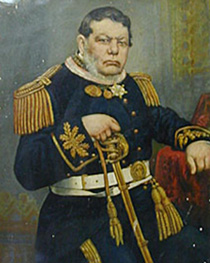David Canabarro
This article includes a list of generalreferences,butit lacks sufficient correspondinginline citations.(January 2013) |
David Canabarro | |
|---|---|
 | |
| Birth name | David José Martins |
| Born | 22 August 1796 Taquari,Captaincy of Rio Grande de São Pedro,Portuguese Empire |
| Died | 1867 (aged 70–71) Santana do Livramento,Rio Grande do Sul,Brazil |
David José Martins,known asDavid Canabarro(born 22 August 1796,Taquari- died 1867,Santana do Livramento) was a Brazilian general.
Biography[edit]
Canabarro was born to José Martins Coelho (fromPorto Alegre) and Mariana de Jesus Ignacia (fromSanta Catarina).
The surname "Canabarro" came from his grandfather, Manuel Teodósio Ferreira, who received the nickname from Luís Teles da Silva Caminha e Meneses, 5th Marquis of Alegrete, and added it to his own name.
Early military career[edit]
Campaigns in the Banda Oriental[edit]
Canabarro began his military career in thefirst campaignin theBanda Orientalof 1811–1812. David, at the age of fifteen, asked his father for permission to take his brother's place.
Canabarro fought for the forces of noble Dom Diogo de Sousa, the count of Rio Pardo. After the campaign he was promoted and returned home, though later he would fight in thesecond campaign in the Banda Oriental,from 1816 to 1820, that culminated in the annexation of the region as a province by theUnited Kingdom of Portugal, Brazil and the Algarvesunder the name ofCisplatina.
Cisplatine War[edit]
Years later, he was a lieutenant in the forces ofBento Gonçalvesin theCisplatine Warin 1825–1828, which culminated in apeace treatyin August 1828 that granted independence toUruguay.There he played an important role in the Battle of Rincón de las Gallinas, saving the Brazilian army on 24 September 1825. This earned him the title of Armylieutenant.He took part in the 21st Light Cavalry Brigade commanded by Bento Gonçalves in theBattle of Ituzaingó.
When the war ended, he continued his military career, this time associated with his uncle Antonio Ferreira Canabarro in the border region with Uruguay near Santana do Livramento. By 1836, he adopted the name Canabarro at the insistence of his uncle. As suggested by historian Ivo Santanese Caggiano: "he must have had some connection with theMachadosandFerreirasofSabrosa.Consequently, the descendants of the nobleCanavarrosof Portugal must be theCanabarrosof Brazil. "
Ragamuffin War[edit]
Canabarro was initially neutral in theRagamuffin War.He later enlisted as alieutenant,but quickly rose through the ranks and took command in June 1843, when Bento Gonçalves, to avoid a split among Republicans, left the command and went on to serve under the orders of Canabarro.
His only defeat in war was in the Battle of Porongos, which relaxed the peace negotiations he undertook with theBaron of Caxias(later Duke). He was surprised by the troops ofMouringueand was defeated, notwithstanding his possession of the Black Lancers.
While negotiating peace with the Empire of Brazil, Canabarro offered his services toJuan Manuel de Rosas,ruler of theArgentine Confederation,who wanted to expand the borders of his country. In exchange for the cooperation of the Ragamuffin rebels, he would get help from Argentina to continue the war against the Empire. Canabarro responded by letter, where he stated his loyalty to the country.
As head of the rebels he accepted the amnesty offered by the government on 18 December 1844 by the Baron of Caxias, who came to be known as "the Peacemaker". In the negotiations on 25 February 1845, it was agreed that the Republicans would choose the next president of the province instead of having him be appointed by the central government inRio de Janeiro.It was agreed that the imperial government would be held accountable for the republican government's debt; that rebel military officers who wished to join the imperial army would remain in their former posts, and that the prisoners would be pardoned.
The Brazilian army[edit]
Canabarro fought in thePlatine Warand in theUruguayan War,receiving the honorary title of "general" with which he fought in theParaguayan War.
Representations in popular culture[edit]
David Canabarro has been portrayed as a character in movies and television shows, played byMilton Mattosin the movieNeto Perde a Sua Alma(2001), and byOscar Simchin the miniseriesA Casa das Sete Mulheres(2003).
Bibliography[edit]
- Porto Alegre, Achylles (1917).Illustrious Men of Rio Grande do Sul.Porto Alegre: Livraria Selbach.
- Caggiano, Ivo (1992).David Canabarro lieutenant of the general.Porto Alegre: Martin Book.
